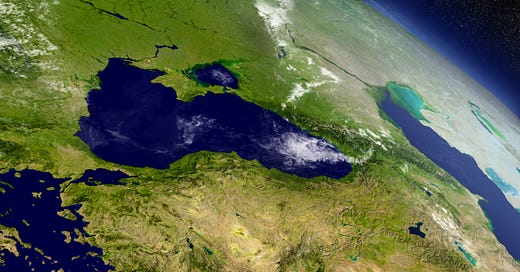Image source: Shutterstock
Time is tight this week so I am resurrecting the Week in the Cyprus Region, a selection of developments that are of medium- to long-term relevance to people living and doing business in Cyprus. I try to pick out developments that you have not already seen multiple times in your social media feeds.
Egypt energy crisis. Egypt is a large source of natural gas but is not producing enough to meet domestic demand. Fertilizer suppliers discovered on 21 May that they would suffer a reduction in natural gas supplies, which will severely affect their output. (Source: Reuters.) Significance for Cyprus. Natural gas exports from the 2.5 trillion cubic feet (tcf) Cronos field in Block 6 of the Republic of Cyprus (ROC) Exclusive Economic Zone (EEZ) are due to be converted into liquefied natural gas (LNG) and sold to European markets, according to announcements in February by the main licence-holders, ENI of Italy and TotalEnergies of France. Don’t be surprised if Egypt ends up buying the LNG.
Israel-US cooling? Ben Caspit of Al-Monitor explains the changing dynamics between Israel and the US and how relations are not close as they used to be. (Source: Al-Monitor, possible paywall.) Significance for Cyprus. Since around 2011, the ROC’s relations with Israel have moved more or less in lock-step with warmer US relations. Lately the government has taken a number of risks to keep relations with Israel close: the president, Nikos Christodoulides, visited the sanctioned Israeli prime minister, Benjamin Netanyahu, on 4 May and Cyprus was among the minority of nine EU member states that voted against a review of the EU-Israel trade and cooperation agreement on 20 May. I don’t expect the close Cyprus-Israel relationship to change but if the US changes its stance this might generate increasing dilemmas for ROC foreign policy.
Greece-China relations. The US is said to be pressurizing Greece to push China out of the port of Thessaloniki port and ideally also the port of Piraeus. (Source: Kathimerini.) While Piraeus is owned by the state, the port manager is the Piraeus Port Authority (PPA), which is majority owned by China COSCO Shipping. Significance for Cyprus. An attempt to squeeze out China might also affect the Great Sea Interconnector (GSI), which has Chinese interests and is due to link Crete and Cyprus and eventually Israel via an underwater electricity cable. The GSI is managed by Greece’s Independent Power Transmission Operator (IPTO or ADMIE), which in turn is 24% owned by China’s State Grid.
Türkiye/Turkey finds more gas. On 17 May Turkey announced a new natural gas discovery in the Black Sea amounting to 75 billion cubic metres* (about 2.6 tcf). (Source: Anadolu Agency.) This is about the same size as ENI’s Cronos in the Republic of Cyprus EEZ. It comes on top of 710 bcm (25 tcf) already discovered in the Black Sea in recent years, some of which is already in production. Significance for Cyprus. There were a number of reasons why Turkey finally pulled out of drilling in the Republic of Cyprus EEZ in late 2020, most of which related to diplomatic pressure and sanctions “(targeted measures”) on individuals working for the Turkish Petroleum Corporation (TPAO). Nevertheless, Turkey’s large discoveries in the Black Sea might also have been influential. If so, then Turkish drill ships might not bother to enter the licensed blocks of the Republic of Cyprus EEZ again, although TPAO has said it plans to drill offshore northern Cyprus and, as I shall explain in end-May Sapienta Country Analysis Cyprus report, we might be entering a tit-for-tat period between Turkey or Turkish Cypriots and Greek Cypriots.
*Factoid. Incidentally, reports that the 75 bcm discovery is worth $30bn have as much credibility as those in 2011 that said the still unexploited Aphrodite discovery in the Republic of Cyprus Block 12 was worth $80bn. These misleading numbers are arrived at by taking the gas price of the day, multiplying it by the discovery volume but then assuming absolutely zero costs for exploration, production, operation, liquefaction/pipeline construction and LNG transit/pipeline transit costs, which in reality would run into the billions. It also assumes zero profit for the companies that spent hundreds of millions exploring and drilling.
If you want my premium monthly in-depth product, check out Sapienta Country Analysis Cyprus and other deep-dive reports here. And if you can’t afford that but want the executive summary only for just €100/year, you can find that here on Substack, at Cyprus Pocket Brief.
Or keep these articles and hugely labour-intensive videos coming by supporting this publication, Sapienta Cyprus Snippets, for just €49 per year.





